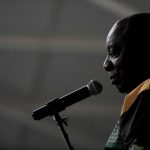Democracy exceeds electoral politics
Now that the votes have been counted, the poisonous idea that money and property are more important than people must be countered by popular democratic organisation – the most effective way to rein…
Author:
13 May 2019

In the wake of the election the elite public sphere has been awash with triumphalism about the undeniable fact that the liberal centre has held. The Economic Freedom Fighters (EEF) and the Vryheidsfront Plus (VF) have made gains, minor in the overall scheme of things. But the salient fact is that the vast bulk of the votes cast, just over 78%, were for the DA and the ANC. And while the ANC does include forces and personalities committed to the predatory and authoritarian form of nationalism that had cohered around Jacob Zuma, it was led into this election by Cyril Ramaphosa, a billionaire heralded, at home and abroad, by capital.
Half the voters under the age of 30 did not bother to register to vote and turnout among registered voters was down. Groundup reported that “for the first time in democratic South Africa, less than half the adult population went to the polls”.
But the fact remains that access to state power is determined by the votes that are cast. Alienation from electoral politics is a telling and important phenomenon but, unless it generates some sort of organisation, it doesn’t become, on its own, a material force in society.
Liberal triumphalism
Some of this liberal triumphalism is understandable. The long ballot paper included a clutch of scurrilous figures, many directly linked to Jacob Zuma, of whom we are well shot. And with the global turn to forms of authoritarian right-wing politics – a grim phenomenon in which figures like Jair Bolsonaro, Narendra Modi, Viktor Orbán and Donald Trump loom with particular malevolence – it’s no bad thing that parties campaigning for the re-instatement of the death penalty and the immediate deportation of migrants sowed their dragon’s teeth on barren ground.
But it is, in global terms, an extraordinary anomaly that parties of the liberal centre were able to win the bulk of the vote in the context of mass impoverishment, systemic unemployment, extremely high rates of inequality, a televised state massacre, regular political assassinations and astonishingly high rates of sustained popular protest. In most societies any of these factors, along with the levels of corruption and state failure witnessed in recent years, would have shaken the political establishment to the core.
Related article:
It is, of course, typical for national liberation movements to enjoy overwhelming support for a generation or so after first accessing state power. But in many cases the first state massacre, or a slide into pervasive corruption, opens up new political possibilities, often for the right. In South Africa the ANC and the DA are both, in essence, claiming the mantle of Nelson Mandela’s ANC and while their electoral support is in decline they remain, together, overwhelmingly dominant.
Neither party is remotely equipped to deal with the profound crisis of our society, which is rooted in mass racialised impoverishment. In economic terms the solutions they offer are as discredited as they are utterly lacking in imagination. Even if the brazen looting that marked the Zuma period is significantly reduced in the next five years, and even if the attempts to actively poison the public sphere and the escalation in repression that also marked that period are also set back, we’ll just be back to business as usual.
Evangelising elections
Elections matter. If, for instance, in the next American presidential election, scheduled for November 2020, Bernie Sanders runs against Donald Trump that result will be highly significant for Americans, and the rest of the world. Sanders has all kinds of limits but abstentionism would not indicate moral superiority. If Trump won a second term it would, on the contrary, indicate complicity.
But not all forms of power are held by governments and political parties frequently represent competing factions of the elite. The distinctly religious cast of the language in which elections are so often spoken of in South Africa is wholly ideological. It’s plainly infinitely better to have elections than to rot under some dictator claiming to incarnate the will of the people but that does not make them the full or final word on democracy.
Around the world progressive rupture with the neoliberal consensus has, particularly since the extraordinary events in Tahir Square in Cairo in 2011, tended to prioritise attempts to build democratic counter-power from below. Of course, as the Egyptian example so painfully shows, undertaking this kind of political work without also taking the realities of electoral politics seriously carries real risks. Abdel Fattah el-Sisi’s prisons are all too real.
The political is more than the electoral
Nonetheless, the reduction of the political to electoral politics is an egregious mistake. The breathless presentation of this election as some sort of sacred ritual via which the innermost will of the people has been publicly divined is a form of ideology that functions to restrict rather than expand the sphere of the political.
It has often been argued that while the election of Silvio Berlusconi as the president of Italy in 2001 was the first sign of what was to come on the global stage, the election of Jacob Zuma as president in 2009 put South Africa ahead of much of the downward curve that ended up with the horrors of Bolsonaro, Modi, Trump, and all the rest.
A more optimistic reading of South Africa history could suggest that the experiments with popular power, imperfect as they were, in the trade union movement, following the Durban strikes in 1973, and then in community-based struggles in the 1980s, put the South African experience well ahead of the counter curve that, especially following the global events of 2011, has seen all kinds of experiments in building popular democratic power outside of electoral politics.
Related article:
This kind of politics had a far more radical conception of democracy than the ubiquitous reduction of the political to electoral politics from 1994. It sought to build democratic forms of organisation, and thereby popular power, where people worked, lived, studied, played and worshipped. Undertaking this under a repressive state required extraordinary courage but, nonetheless, forms of dual power were created.
In 2019 we do not inhabit a fully liberal democracy. The middle class can deliberate and vote in safety, and then watch other middle-class people safely discuss the election on television. Many impoverished people, particularly in KwaZulu-Natal, inhabit a situation in which even scrupulously democratic forms of dissent carry the risk of serious repression, including assassination. Ramaphosa’s declaration after the votes were counted that “Freedom does indeed reign in South Africa” was an obscene and deliberately obfuscatory gesture given the long list of activists, from Marikana to the shacklands of Durban, who have lost their lives in recent years.
But although we don’t all enjoy basic liberal freedoms, and independent organisation carries real risk for some people, and in some places, popular democratic organisation remains the best way to seek to restrain the liberal hubris that is now flourishing and, already, arguing that more rights for business – for the rule of money and property over society – is the only viable way forward.


